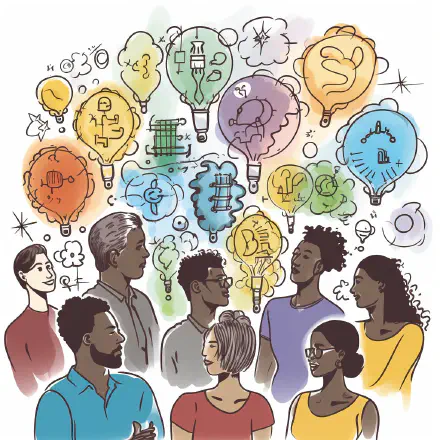
Emotional intelligence (EI) is the ability to understand, manage, and regulate our own emotions, as well as recognize and empathize with the emotions of others. Developing emotional intelligence can have significant benefits, particularly in the workplace, where it can lead to better communication, collaboration, and decision-making.
In this blog, we will focus specifically on two key components of emotional intelligence: empathy and self-regulation. We will explore why these skills are important and how you can develop them to improve your thinking and decision-making abilities.
The Importance of Empathy
Empathy is the ability to put yourself in someone else’s shoes and understand their thoughts, feelings, and perspectives. It involves not only recognizing emotions in others but also responding in a way that shows you understand and care about their experiences.
Empathy is essential for building relationships, particularly in the workplace. It allows you to understand and connect with your colleagues and clients, leading to better communication and collaboration. It can also help you to negotiate and resolve conflicts more effectively, as you are better able to understand the other person’s point of view.
In addition, empathy is crucial for effective leadership. A leader who is able to empathize with their team members is more likely to understand their needs and concerns, and to create a supportive and inclusive work environment. This, in turn, can lead to higher employee morale, productivity, and retention.
Developing Empathy
Empathy is a skill that can be developed with practice. Here are some strategies you can use to improve your empathy:
-
Listen actively: When someone is talking to you, give them your full attention. Try to understand not just the words they are saying, but also their tone of voice, body language, and facial expressions.
-
Ask questions: Ask open-ended questions that encourage the other person to share more about their experiences and perspectives.
-
Practice perspective-taking: Put yourself in someone else’s shoes and imagine how they might be feeling. This can help you to understand their perspective and respond more empathetically.
-
Practice mindfulness: Mindfulness can help you to be more present and aware of your own emotions, which can in turn make you more empathetic towards others.
The Importance of Self-Regulation
Self-regulation is the ability to manage your own emotions and behavior, particularly in stressful or challenging situations. It involves being able to stay calm and focused, even when faced with difficult circumstances.
Self-regulation is important for a number of reasons. First, it allows you to think more clearly and make better decisions. When you are able to regulate your emotions, you are less likely to make impulsive or irrational choices. Second, self-regulation is important for maintaining positive relationships. When you are able to stay calm and respond in a thoughtful and measured way, you are less likely to say or do something that could damage your relationships with others.
Finally, self-regulation is important for managing stress and preventing burnout. When you are able to regulate your emotions and maintain a sense of calm, you are better able to cope with the demands of work and life.
Developing Self-Regulation
Like empathy, self-regulation is a skill that can be developed with practice. Here are some strategies you can use to improve your self-regulation:
-
Practice mindfulness: Mindfulness can help you to be more aware of your own emotions and to regulate them more effectively. Try incorporating mindfulness practices, such as meditation or deep breathing, into your daily routine.
-
Identify your triggers: Think about the situations or people that tend to trigger negative emotions in you. Once you have identified these triggers, you can work on developing strategies to manage your emotions more effectively when faced with them.
-
Use positive self-talk: When you are feeling stressed or overwhelmed, try using positive self-talk to help you stay calm and focused. For example, you might tell yourself, “I can handle this” or “I am capable and competent.”
-
Take care of yourself: Self-regulation is much easier when you are well-rested, well-nourished, and well-exercised. Make sure to prioritize self-care activities, such as getting enough sleep, eating nutritious foods, and engaging in regular physical activity.
Putting it All Together
Developing empathy and self-regulation can have significant benefits, both personally and professionally. By improving your ability to understand and connect with others, as well as manage your own emotions and behavior, you can become a more effective thinker, communicator, and decision-maker.
To begin developing these skills, try incorporating some of the strategies outlined above into your daily routine. With practice and persistence, you can build your emotional intelligence and enjoy the many benefits that come with it.



